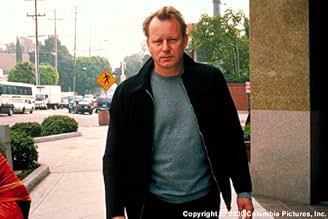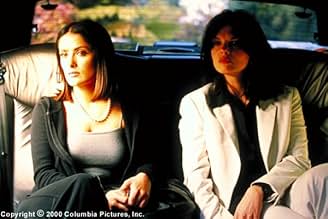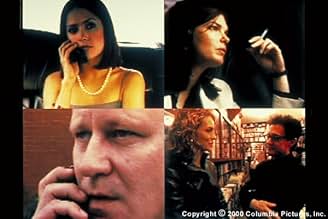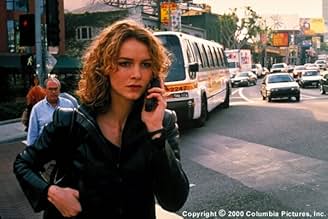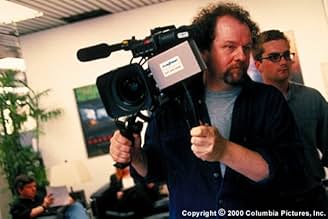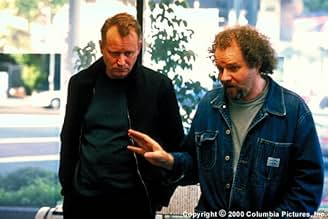IMDb RATING
6.0/10
7.3K
YOUR RATING
Four frames of simultaneous action that alternately follow a smitten lesbian lover as she obsesses over her partner's dalliances and the tense goings-on of a Hollywood film production compan... Read allFour frames of simultaneous action that alternately follow a smitten lesbian lover as she obsesses over her partner's dalliances and the tense goings-on of a Hollywood film production company.Four frames of simultaneous action that alternately follow a smitten lesbian lover as she obsesses over her partner's dalliances and the tense goings-on of a Hollywood film production company.
- Awards
- 2 nominations total
- Director
- Writer
- All cast & crew
- Production, box office & more at IMDbPro
Featured reviews
`Time Code' is the first film to use the method of split-screen quadrants where four stories, done in real time, unfold onto the screen. And an audacious, refined experience it is. This technique was going to be hit-and-miss. With four stories, you can only watch one at a time, and by focusing on one you may miss some key elements in another story. All are loosely intertwined, some more interesting than others. There is no digital grading/ authentication done to the images, so the film looks perfectly realistic.
The sound is emphasised on one of the screens at a time, though sometimes it is hard to differentiate which one. While the stories are perfectly watchable, they aren't invigorating or compelling and are only worthy of a passive attention. The narrative is strong and continued in a series of earthquakes that would rank about a 4 on the Richter scale. This is the first occasion in which I can honestly say that characters get plenty of screen-time (in fact they are in every scene), but barely develop.
Case in point is Saffron Burrows whose character is barely ever emphasised upon and we are offered pretty much no guidance as to what's going on in her story. Jeanne Tripplehorn's part is pretty much wasted as 95% of her screen-time is wasted on her simply sitting in her limo, barely even talking. She shows her true colours in the end, but these revelations are made too late in the game to be indispensable. In the third quadrant, there are many big names such as Holly Hunter, Salma Hayek, Julian Sands (`Leaving Las Vegas', `Naked Lunch), Stellan Skargaard (`The Glass House') and Kyle McLachlan. There are solid, subtle performances all round from the ensemble, but the characters themselves are poorly written.
Still though, Mike Figgis' avant-garde risque direction is suitably original and proves to be a talent to look out for in the future. While it is an accurate portrayal of high-class Los Angeles, there is an over-emphasis on drug use and lesbianism that compromises the originality of it all. `Time Code' must have been a step away from `impossible' to film. As there were no edits and stories took place in real time as they interwove, there's no telling how many takes they had to execute.
If one actor were to forget their line after about 90 minutes, everything would have to start all over again from the top. It's a surprise that the film even finished shooting, but they pulled it off and that deserves admiration. The movie ends on a sourly climactic moment that may leave a bad taste, but seems perfectly in keeping with Figgis' bravura tone. If you haven't yet seen `Time Code' it's best you know the gist of the plot and sub-plots before watching it, or you'll be absolutely lost from start to finish.
One of the most groundbreaking, though not spectacular, movies in recent year, `Time Code' proves to be an intelligent, admirable effort. While this experiment is unlikely to be attempted again, this is the first and undoubtedly the best of its kind. It definitely should have received attention on Oscar night. Curiously enough, the sound effects editing is the film's strongest point. My IMDb rating: 7.4/10.
The sound is emphasised on one of the screens at a time, though sometimes it is hard to differentiate which one. While the stories are perfectly watchable, they aren't invigorating or compelling and are only worthy of a passive attention. The narrative is strong and continued in a series of earthquakes that would rank about a 4 on the Richter scale. This is the first occasion in which I can honestly say that characters get plenty of screen-time (in fact they are in every scene), but barely develop.
Case in point is Saffron Burrows whose character is barely ever emphasised upon and we are offered pretty much no guidance as to what's going on in her story. Jeanne Tripplehorn's part is pretty much wasted as 95% of her screen-time is wasted on her simply sitting in her limo, barely even talking. She shows her true colours in the end, but these revelations are made too late in the game to be indispensable. In the third quadrant, there are many big names such as Holly Hunter, Salma Hayek, Julian Sands (`Leaving Las Vegas', `Naked Lunch), Stellan Skargaard (`The Glass House') and Kyle McLachlan. There are solid, subtle performances all round from the ensemble, but the characters themselves are poorly written.
Still though, Mike Figgis' avant-garde risque direction is suitably original and proves to be a talent to look out for in the future. While it is an accurate portrayal of high-class Los Angeles, there is an over-emphasis on drug use and lesbianism that compromises the originality of it all. `Time Code' must have been a step away from `impossible' to film. As there were no edits and stories took place in real time as they interwove, there's no telling how many takes they had to execute.
If one actor were to forget their line after about 90 minutes, everything would have to start all over again from the top. It's a surprise that the film even finished shooting, but they pulled it off and that deserves admiration. The movie ends on a sourly climactic moment that may leave a bad taste, but seems perfectly in keeping with Figgis' bravura tone. If you haven't yet seen `Time Code' it's best you know the gist of the plot and sub-plots before watching it, or you'll be absolutely lost from start to finish.
One of the most groundbreaking, though not spectacular, movies in recent year, `Time Code' proves to be an intelligent, admirable effort. While this experiment is unlikely to be attempted again, this is the first and undoubtedly the best of its kind. It definitely should have received attention on Oscar night. Curiously enough, the sound effects editing is the film's strongest point. My IMDb rating: 7.4/10.
You know, some times an 'idea' has never been done before because it should never be done. This movie is a perfect example. Why on earth would anybody think that people want to see a movie split into four quadrants?
I mean, I could take a script as bad as this, and film it upside down. Does that make it good because it is 'daring and original'?
I mean, I could take a script as bad as this, and film it upside down. Does that make it good because it is 'daring and original'?
10neil_mc
I am pretty sure that I will not see a more jaw-dropping piece of film-making for quite some time. To put the complexity of filming 4 continuous takes simultaneously and in full co-ordination into any perspective, is extremely difficult. And then to have such a dramatic climax at the end of 93 improvised minutes is pretty mind-blowing.
I'm sure plenty of people will scream "pretentious crap" - as the girl suggests in her meeting speech - but the innovative brilliance of this film should be applauded above everything else. For example, little things like how the camera is focused on Skarsgard in the meeting while his wife is having it away with another woman. And then bigger things such as each screen simultaneously focusing in close-up on their characters eyes. Unbelievable.
I'm sure this isn't everybody's cup of tea - some people just don't appreciate the concept of doing something unique and risky. Some people even go as far as criticising Mike Figgis for attempting this - when in truth, this experiment was never likely to reach the masses, so any accusation of arrogance/pretension are pathetic.
As for the story and acting, I have a sneaky suspicion that maybe the sound was turned down on certain screens in post-production when actor's were fumbling or struggling for dialogue, I also thought the sound should have been muted from the other 3 screens while we were focused on one - because at times we get mumbling from all 4 at once, which doesn't work. But none of this detracts from a truly great achievement from all involved - for actors to go 93 minutes undisturbed is very impressive.
A perfectly constructed and co-ordinated film, I am in absolute awe. 10/10
I'm sure plenty of people will scream "pretentious crap" - as the girl suggests in her meeting speech - but the innovative brilliance of this film should be applauded above everything else. For example, little things like how the camera is focused on Skarsgard in the meeting while his wife is having it away with another woman. And then bigger things such as each screen simultaneously focusing in close-up on their characters eyes. Unbelievable.
I'm sure this isn't everybody's cup of tea - some people just don't appreciate the concept of doing something unique and risky. Some people even go as far as criticising Mike Figgis for attempting this - when in truth, this experiment was never likely to reach the masses, so any accusation of arrogance/pretension are pathetic.
As for the story and acting, I have a sneaky suspicion that maybe the sound was turned down on certain screens in post-production when actor's were fumbling or struggling for dialogue, I also thought the sound should have been muted from the other 3 screens while we were focused on one - because at times we get mumbling from all 4 at once, which doesn't work. But none of this detracts from a truly great achievement from all involved - for actors to go 93 minutes undisturbed is very impressive.
A perfectly constructed and co-ordinated film, I am in absolute awe. 10/10
"Timecode" is not conventional filmmaking, which is the whole beauty of it. This is a totally improvised piece of cinema, shot on a hand-held camera for 90 minutes straight--not a single cut--and shot in real-time. Every word of dialogue is improvised, the only thing written is the story (also by Mike Figgis). The way it turned out is quite impressive. Of course, the process gets tiresome and repetitive at times, but overall it's a pretty fascinating work that will probably be better appreciated by the more open-minded moviegoer--as opposed to mainstream viewers who will probably view this as just plain weird.
I was really impressed by the talented cast filled with great actors who simply went through the WHOLE ENTIRE process without once messing up. If you watch all these behind-the-scenes specials with actors stumbling line-after-line, doing take-after-take, until they finally get it right the 100th time--it's astounding to see that the whole cast was able to pull this off without a scratch. Even with such talented actors like Stellan Sarsgard, Holly Hunter, Salma Hayek, Jeanne Tripplehorn, etc., I have to commend them especially for taking part in this risky project. This movie not only showcases their knacks for acting, but also their potential to try something new, innovative and quite difficult--after all, taking risks is one of the main elements in becoming a good actor.
This type of format does--at points--feel like a theatrical version of a "Big Brother" episode, but Figgis wrote a story with as much intriguing elements as he can possibly fit into a film of this scope. After all, this is supposed a day-in-the-life type of story and you don't want to be too far-fetched. So he tries to generate as much suspense and intrigue (involving the many smutty attributes of the stereotypical white-collar LA resident) as he possibly could. There are subplots involving drug abuse, alcohol abuse, homosexuality, philandering, jealousy and of course the biggest theme of all...Sex! Naturally, my interest did sometimes drift, but the material compelled me enough to be interested for the majority of the running time. I've never been a fan of those corny reality shows. Quite frankly, I think the kind of reality displayed on those programs is very dull. "Timecode" transcends the dullness of the reality shows and, in a way, the "Blair Witch Project" (which is another reality-based film shot entirely on a hand-held camera, but executed very poorly). The material is engaging to a degree, the actors perform it very well and everything is down-to-earth to preserve its sense of realism. My only criticisms lie in the "earthquake effects." Those looked totally cheesy, created entirely by camera tricks and actors pretending to be shaken up. In one of the closing scenes, Jeanne Tripplehorn is clinging on to a nearby bannister while you can see cars in the background moving along smoothly. He could've done without that pretentious trick.
I'm not saying this a great film, but it is one I'll remember for its unique sense of style and I will always remember Mike Figgis for coming up with this innovative method. If you're tired of mainstream cinema and feel anxious to see something new and exciting--this is a film I would recommend.
My score: 7 (out of 10)
I was really impressed by the talented cast filled with great actors who simply went through the WHOLE ENTIRE process without once messing up. If you watch all these behind-the-scenes specials with actors stumbling line-after-line, doing take-after-take, until they finally get it right the 100th time--it's astounding to see that the whole cast was able to pull this off without a scratch. Even with such talented actors like Stellan Sarsgard, Holly Hunter, Salma Hayek, Jeanne Tripplehorn, etc., I have to commend them especially for taking part in this risky project. This movie not only showcases their knacks for acting, but also their potential to try something new, innovative and quite difficult--after all, taking risks is one of the main elements in becoming a good actor.
This type of format does--at points--feel like a theatrical version of a "Big Brother" episode, but Figgis wrote a story with as much intriguing elements as he can possibly fit into a film of this scope. After all, this is supposed a day-in-the-life type of story and you don't want to be too far-fetched. So he tries to generate as much suspense and intrigue (involving the many smutty attributes of the stereotypical white-collar LA resident) as he possibly could. There are subplots involving drug abuse, alcohol abuse, homosexuality, philandering, jealousy and of course the biggest theme of all...Sex! Naturally, my interest did sometimes drift, but the material compelled me enough to be interested for the majority of the running time. I've never been a fan of those corny reality shows. Quite frankly, I think the kind of reality displayed on those programs is very dull. "Timecode" transcends the dullness of the reality shows and, in a way, the "Blair Witch Project" (which is another reality-based film shot entirely on a hand-held camera, but executed very poorly). The material is engaging to a degree, the actors perform it very well and everything is down-to-earth to preserve its sense of realism. My only criticisms lie in the "earthquake effects." Those looked totally cheesy, created entirely by camera tricks and actors pretending to be shaken up. In one of the closing scenes, Jeanne Tripplehorn is clinging on to a nearby bannister while you can see cars in the background moving along smoothly. He could've done without that pretentious trick.
I'm not saying this a great film, but it is one I'll remember for its unique sense of style and I will always remember Mike Figgis for coming up with this innovative method. If you're tired of mainstream cinema and feel anxious to see something new and exciting--this is a film I would recommend.
My score: 7 (out of 10)
In an age where top-rated films involve Australians in xenophobic, concocted histories, or should-know-better Oscar winners in films about nicking cars, innovation seems rarely welcome.
It comes as no surprise then that the first film to be told via four separate panels on the screen, with continuous 93m takes and improvisation should only be shown on one single screen in the whole of the West Midlands.
What did surprise me, however, is that the film isn't that good. It is above average, though is too mainstream to really appeal to the artset, and too arty to interest a mainstream audience. The attention is directed around the four separate panels by virtue of judicious sound editing; dips and fades occurring throughout.
Of the four panels, while their fixations may merge or change, generally speaking they take the following form: the top two are the serious ones, the upper left seeing Lauren Hathaway (Jeanne Tripplehorn) using surveillance to listen in on her girlfriend's conversations, whom she (correctly) suspects is having an affair. The upper right is the dullest, a meandering affair with the self-absorbed Emma (Saffron Burrows) who goes through counselling and has very little interaction or involvement with the rest of the film.
Lower left are the cast-offs, often sharing perspective with its adjacent panels and mostly being used for light relief. Lower right, arguably the most interesting, is centred on a movie production meeting which allows for some industry parodies. These include movies such as "Time Toilet", "Bitch" and a hip-hop Soviet incidental music that offers "Can you dig it - Trotsky in da house!"
I did chuckle at the Asian staff member whose name - Connie Ling - produces sniggers when introduced, though Onyx Richardson's (Golden Brooks) assertion that black people get short shrift in film seems hollow when you consider the only thing her character gets to talk about is her colour, and that she's the only black cast member. The film's lesbian relationships also seem only there for titillation. Lastly, when you meet a character who pitches a film based around four separate panels and continuous takes (dismissed by a committee member as "pretentious s***") you realise that this film either isn't as clever as it thinks it is or too clever by half. Without the gimmickry - and it could easily get by with only half of it's four screens - this would be a forgettable 4. Therefore, isn't it a pity that the innovation wasn't applied to a better movie? 6/10.
It comes as no surprise then that the first film to be told via four separate panels on the screen, with continuous 93m takes and improvisation should only be shown on one single screen in the whole of the West Midlands.
What did surprise me, however, is that the film isn't that good. It is above average, though is too mainstream to really appeal to the artset, and too arty to interest a mainstream audience. The attention is directed around the four separate panels by virtue of judicious sound editing; dips and fades occurring throughout.
Of the four panels, while their fixations may merge or change, generally speaking they take the following form: the top two are the serious ones, the upper left seeing Lauren Hathaway (Jeanne Tripplehorn) using surveillance to listen in on her girlfriend's conversations, whom she (correctly) suspects is having an affair. The upper right is the dullest, a meandering affair with the self-absorbed Emma (Saffron Burrows) who goes through counselling and has very little interaction or involvement with the rest of the film.
Lower left are the cast-offs, often sharing perspective with its adjacent panels and mostly being used for light relief. Lower right, arguably the most interesting, is centred on a movie production meeting which allows for some industry parodies. These include movies such as "Time Toilet", "Bitch" and a hip-hop Soviet incidental music that offers "Can you dig it - Trotsky in da house!"
I did chuckle at the Asian staff member whose name - Connie Ling - produces sniggers when introduced, though Onyx Richardson's (Golden Brooks) assertion that black people get short shrift in film seems hollow when you consider the only thing her character gets to talk about is her colour, and that she's the only black cast member. The film's lesbian relationships also seem only there for titillation. Lastly, when you meet a character who pitches a film based around four separate panels and continuous takes (dismissed by a committee member as "pretentious s***") you realise that this film either isn't as clever as it thinks it is or too clever by half. Without the gimmickry - and it could easily get by with only half of it's four screens - this would be a forgettable 4. Therefore, isn't it a pity that the innovation wasn't applied to a better movie? 6/10.
Did you know
- TriviaThe actors and actresses were responsible for their own costumes, hair, and make-up.
- GoofsCameraman reflected on an elevator door as he follows Emma after the therapist sequence.
- Alternate versionsThe film was transferred from digital video to film stock for theatrical presentation. The video release, however, uses the original digital video picture format.
- SoundtracksComfort Of Strangers
Written by Mike Figgis, Anthony Marinelli and Skin
Performed by Skin
Courtesy of Virgin Records Limited
By Arrangement with Red Mullet Ltd.
- How long is Timecode?Powered by Alexa
Details
Box office
- Budget
- $5,000,000 (estimated)
- Gross US & Canada
- $1,057,750
- Opening weekend US & Canada
- $93,148
- Apr 30, 2000
- Gross worldwide
- $1,431,406
- Runtime
- 1h 37m(97 min)
- Color
- Sound mix
- Aspect ratio
- 1.85 : 1
Contribute to this page
Suggest an edit or add missing content


